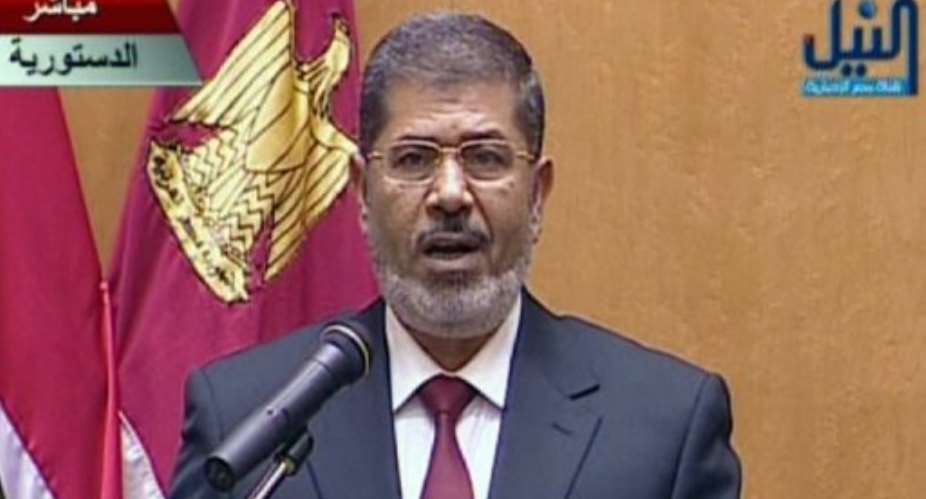CAIRO (AFP) - President Mohamed Morsi took the oath of office on Saturday to become Egypt's first freely elected leader and its first head of state since Hosni Mubarak's overthrow last year.
"I swear by the Almighty God to sincerely preserve the republican order and to respect the constitution and law, and completely care for the people's interest," he said at the ceremony in the Constitutional Court.
Clad in a suit and burgundy tie, he promised to lead a "civil, constitutional and modern state" in a short speech after taking the oath.
Morsi, the winner of a June 16-17 election run-off, was forced to take his oath at the court instead of in parliament after the military disbanded the Islamist-led house following a court order earlier this month.
He already symbolically took his oath on Friday before tens of thousands of supporters in Cairo's Tahrir Square, epicentre of the revolt that overthrew Mubarak on February 11, 2011.
After the swearing in ceremony, Morsi headed to Cairo University to give his first presidential address.
Morsi, who resigned from the Muslim Brotherhood movement after winning the election, now faces a struggle with the military that oversaw the transition after Mubarak's overthrow and which insists on retaining broad powers.
"I renounce none of the prerogatives of president," he said in his address in Tahrir Square. "You are the source of power and legitimacy," he told his supporters.
"There is no place for anyone or any institution... above this will."
The military has assumed parliament's powers after disbanding it and also formed a powerful national security council headed by the president but dominated by generals.
By agreeing to be sworn in by the Constitutional Court, Morsi in effect recognised the court's decision to dissolve parliament after the court ruled that a third of the house had been elected illegally.
The military also reserves the right to appoint a new constituent assembly should the one elected by parliament be disbanded by a court decision expected on September 1.
The Muslim Brotherhood insists only parliament can appoint the assembly.
Media reports said Morsi was consulting a cross-section of Egyptian society before appointing a premier and a cabinet mostly made up of technocrats.
In a meeting with newspaper editors reported by most dailies on Friday, Morsi pledged there would be "no Islamisation of state institutions" during his presidency.
Morsi has already met Egypt's military ruler Field Marshal Hussein Tantawi, as well as a delegation from the Sunni body Al-Azhar, and another representing Egypt's Coptic church.
International Monetary Fund chief Christine Lagarde has told Morsi the lender stands ready to help Egypt, whose tourism-dependent economy took a battering in the upheaval that accompanied Mubarak's overthrow, a spokeswoman said on Friday.
As his successor took the oath, the ousted strongman was in a Cairo military hospital, in low morale and slipping in and out of a coma, according to hospital officials.
"The former president has been greatly affected by the news of Morsi's presidential victory," said one official at the hospital where Mubarak was transferred last week from a prison where he had been serving a life sentence over his involvement in the deaths of hundreds of protesters in the uprising.
Morsi became the Brotherhood's candidate to succeed Mubarak only after its first choice Khairat El-Shater was disqualified. He beat Ahmed Shafiq, Mubarak's last premier, with 51.73 percent of the vote.
Many had written Morsi off as an uncharismatic substitute, saying he would be unable to muster widespread support.
But the powerful Brotherhood mobilised its formidable resources and supporters behind Morsi, who was appointed last year to head its political arm, the Freedom and Justice Party.
In a 2005 election, which gave the Brotherhood one fifth of places in parliament, Morsi kept his seat. But he was soon arrested and jailed for seven months after taking part in protests supporting reformist judges.
By the 2010 election, Mursi had become a spokesman for the Islamists and a member of their politburo.





 April 20: Cedi sells at GHS13.63 to $1, GHS13.06 on BoG interbank
April 20: Cedi sells at GHS13.63 to $1, GHS13.06 on BoG interbank
 Dumsor: I'm very disappointed in you for messing up the energy sector — Kofi Asa...
Dumsor: I'm very disappointed in you for messing up the energy sector — Kofi Asa...
 Dumsor: Instruct ECG MD to issue timetable and fire him for lying — Kofi Asare t...
Dumsor: Instruct ECG MD to issue timetable and fire him for lying — Kofi Asare t...
 Ashanti region: Road Minister cuts sod for 24km Pakyi No.2 to Antoakrom road con...
Ashanti region: Road Minister cuts sod for 24km Pakyi No.2 to Antoakrom road con...
 Train crash: ‘How could any normal person leave a car on rail tracks?’ — Frankli...
Train crash: ‘How could any normal person leave a car on rail tracks?’ — Frankli...
 Train crash: Driver of abandoned vehicle not our branch chairman nor secretary —...
Train crash: Driver of abandoned vehicle not our branch chairman nor secretary —...
 Kenya pays military homage to army chief killed in copter crash
Kenya pays military homage to army chief killed in copter crash
 US agrees to pull troops from key drone host Niger: officials
US agrees to pull troops from key drone host Niger: officials
 Mahama vows to scrap teacher licensure exams, review Free SHS policy
Mahama vows to scrap teacher licensure exams, review Free SHS policy
 Government will replace burnt Madina shops with a new three-story, 120-store fac...
Government will replace burnt Madina shops with a new three-story, 120-store fac...
